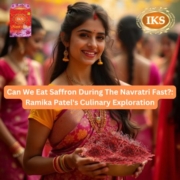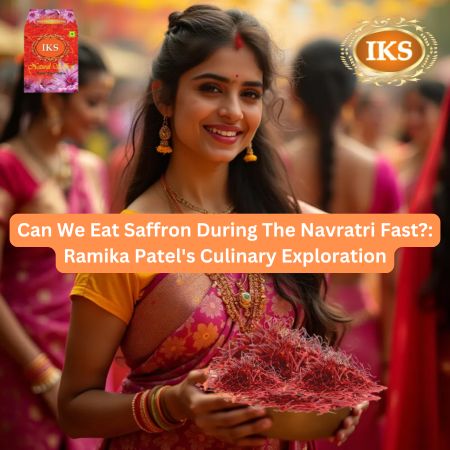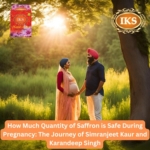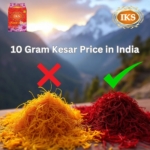Can We Eat Saffron During The Navratri Fast?: Ramika Patel’s Culinary Exploration
Ramika Patel’s Culinary Journey: Exploring the Role of Saffron During Navratri Fasting in Surat, Gujarat
Can We Eat Saffron During The Navratri Fast ? – In the vibrant city of Surat, Gujarat, where culture dances harmoniously with tradition, lives a young woman named Ramika Patel. Known for her inquisitive nature and culinary skills, Ramika found herself caught in a dilemma as the auspicious festival of Navratri approached. Each year, the nine-night festival celebrates the divine feminine, honoring the goddess Durga through fasting, prayer, and devotion. As Ramika prepared for the festivities, a question lingered in her mind: Can we eat kesar during the Navratra fasting?
Elevate Your Fasting Experience! Order Quality Kesar Online for Delicious Recipes!
The Significance of Navratri
Navratri, which translates to ‘nine nights,’ is a time of reverence and celebration. It is believed that during these nine nights, the goddess Durga descended to Earth to vanquish evil and restore balance. Devotees abstain from certain foods and indulge in spiritual practices, including fasting, dancing, and chanting. The festival is marked by colors, music, and scrumptious food that typically adheres to specific dietary restrictions.
For Ramika, Navratri was not just a festival; it was a cherished family tradition. Growing up in a household that celebrated the festival with fervor, she had always participated in the rituals, helping her mother make traditional dishes suitable for the fast. However, this year felt different. As she prepared to join her family in honoring the goddess, her curiosity about saffron crept into her mind.
The Role of Saffron in Indian Cuisine
Kashmir Saffron, known as ‘Kashmiri Kesar‘ in Hindi, is a prized spice derived from the flower of Crocus sativus. Renowned for its vibrant color, unique flavor, and numerous health benefits, saffron has been a staple in Indian cuisine for centuries. Often used in pulav, sweets, and milk-based dishes, it is revered for its ability to enhance flavor and aroma.
Despite its luxurious reputation, saffron is also known for its medicinal properties. It is believed to have antioxidant, anti-inflammatory, and mood-enhancing effects. However, as Ramika contemplated its inclusion in her Navratri fast, she sought to delve deeper into the traditions surrounding fasting restrictions.
The Dilemma of Dietary Restrictions – Can We Eat Saffron During The Navratri Fast?
As Ramika researched the dietary guidelines for Navratri, she discovered that the fast typically involves abstaining from certain foods, such as grains, garlic, and even some vegetables. The primary focus is on consuming fruits, nuts, and specific flours (like buckwheat and water chestnut). But what about saffron?
Ramika turned to her grandmother, a fountain of wisdom. Her grandmother had always emphasized the importance of understanding the spiritual significance behind the fasting rules. “Saffron is considered a pure and auspicious ingredient,” she explained. “It is often used in offerings to the goddess. If our intention is pure and we consume it in moderation, it may not break the fast. Yes, you can eat saffron.”
Seeking Guidance from the Community – Can We Eat Saffron During The Navratri Fast?
Intrigued by her grandmother’s words, Ramika decided to seek further guidance. She visited her local temple, where she spoke to the priests and fellow devotees about saffron’s role during the fast. Some elders believed that saffron could be consumed in moderation, especially when used in dishes like ‘kheer’ (rice pudding) or ‘sabudana khichdi’ (sago dish), which are commonly prepared during Navratri.
Others, however, held a more traditional view, insisting that any ingredient outside the prescribed list should be avoided. “It’s about discipline and devotion,” one elder remarked. “The fast is a time to purify the body and soul, and we must respect the guidelines.”
Experimenting with Saffron
With conflicting opinions swirling in her mind, Ramika decided to conduct her own experiment. She wanted to honor her family’s traditions while also embracing her culinary creativity. She envisioned a Navratri feast that incorporated saffron in a way that remained respectful to the fasting protocols.
That evening, she gathered her ingredients: fresh fruits, nuts, and a small amount of saffron. With a sense of excitement, she began to prepare a saffron-infused kheer. As she stirred the milk and added the saffron strands, the kitchen filled with a warm, inviting aroma. She also prepared a side of sabudana khichdi, carefully following the fasting guidelines.
The Family Feast
When the time for the family feast arrived, Ramika’s heart raced with anticipation. Her family gathered around the table, their faces glowing with excitement as they admired the spread she had prepared. The saffron kheer shimmered with a golden hue, while the sabudana khichdi looked delectable with its garnished peanuts and coriander.
As her family tasted the saffron kheer, Ramika held her breath. To her delight, their faces lit up with joy. “This is amazing!” her younger brother exclaimed. “The saffron adds a whole new dimension to the dish!”
Ramika felt a wave of relief wash over her. The saffron had not only enhanced the flavor but had also brought her family together in celebration. The dish became a symbol of her devotion, creativity, and respect for tradition.
Reflection and Conclusion – Can We Eat Saffron During The Navratri Fast?
As the nine nights of Navratri unfolded, Ramika embraced the festival with renewed vigor. She continued to include saffron in her meals, mindful of her family’s traditions and the spiritual significance of her choices.
In her journey of exploration, Ramika discovered that the essence of Navratri lies not solely in rigid adherence to rules but in the spirit of devotion, creativity, and love for family. Through her culinary adventure, she learned that sometimes, breaking the mold can lead to beautiful new traditions.
As the festival came to an end, Ramika reflected on her experience. The question of whether kashmir saffron could be consumed during the fast had transformed into a deeper understanding of faith, community, and the importance of honoring the past while embracing the future.
In the heart of Surat, Ramika Patel had woven saffron into the fabric of her Navratri celebration, reminding herself and those around her that food, like tradition, can be both a source of nourishment and a canvas for creativity.








Leave a Reply
Want to join the discussion?Feel free to contribute!